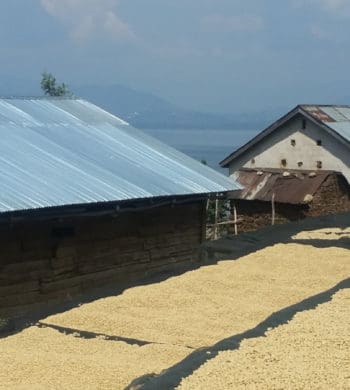The Muungano cooperative is located over three hours south of Goma, on a questionable dirt road on the Western shore of Lake Kivu. The closest town is Minova, which is a ramshackle and bustling hamlet, trafficking largely in manioc, fish, and “road taxes.” And though I did not feel that my tax dollars were being put to very good use as we banged over rocks and wallowed through muddy troughs, the visit to Muungano was totally worth the drive.
Founded in 2009, Muungano coop is comprised of around 4,400 smallholder farmers, nearly half of them women. Gender justice is a principal focus of the members, as is integrating farmers from different ethnic groups into the operation. The word “Muungano” actually means “Togetherness” in the Swahili language. When we first visited the group, they were milling coffee on equipment from the early twentieth century, but still managed to produce the best Congo coffee we had ever tasted. Since then, they have installed two new washing stations, a new cupping lab and have a trained roaster and cupper on staff. The fruits of their hard work are evident in the sweet, bright, and complex coffees they produce every year.
Despite the many challenges faced by coffee producers in the DRC, the co-op members are remarkably focused, professional, and upbeat, and have done a phenomenal job of getting the most out of the ancient Bourbon coffee trees growing in the region.
Muungano cooperative members are remarkable for their eagerness to learn what they could do to deepen our commercial relationship improve the quality of their production. A visit to Muungano is a great reminder of how hard our growers work to produce their coffee – often with incredibly limited infrastructure, and in very difficult circumstances. Atlas is extremely proud to be one of the very first importers in North America to offer this exceptional coffee. In 2017, Muungano also obtained their Organic certification, opening new doors to sustainable specialty coffee markets. In 2018 they started producing natural-processed coffee in small volumes and were some of the nicest natural-processed coffees we’ve ever cupped!
In the desire to expand our Muungano offerings to clients, as of 2023 Atlas will be importing a small volume of the farmer-washed Kivu 4 grade from Muungano in addition to the fully-washed higher grade Kivu 3. Muungano processes its coffees so thoroughly at the farm level that their Kivu 4 (which is typically seen as lower in quality) consistently scores in the 83-85 point range and useful in a variety of applications.
Please see here a detailed image of Muungano’s processing from cherry to export.
2023 Harvest Update
In June 2023 we visited Muungano and had the opportunity to learn of recent updates. Muungano currently has 4 main washing stations (Nyangoma, Buchiro, Kinyezire, and Nyabirehe), and 3 micro washing stations (Karango, Bishenge, and Chembumba) which span a vast geographical area along the western shores of Lake Kivu, from Kinyezire (where Muungano’s headquarters are located) to Minova, an hour west of Goma.
One of Muungano’s most exciting recent developments is that, in January 2023 Muungano purchased a small dry mill in Goma from a USADF grant, and will not only be able to process this year’s coffee at the mill, but also offer value-add milling services to other coffee cooperatives who lack their own dry mill. Not long before our visit, Muungano had received confirmation from Nuru, the largest off-grid mini-grid solar in sub-Saharan Africa, that they would be able to run their dry mill operations using solar energy, lowering their carbon footprint and the expense of using a gas-powered generator.
In addition to producing some of the region—if not the country’s—finest coffees, Muungano is also strengthening its value chains by investing in some of its most important members: its women. In collaboration with Rebuild Women’s Hope cooperative and the French embassy, Muungano is currently doing a women’s literacy and economic skills project. They are also learning additional income-generating activities such as sewing and craft projects.
In 2021, using Fairtrade funds, Muungano began construction on a much-needed, centrally located community and maternal health clinic. They need additional container sales to complete the construction, but even as the clinic is only partially finished, they can use one of the rooms to teach sewing. Once complete, the clinic will be able to treat wounds, provide basic medicines to community and cooperative Members, and have a maternity section. They even have land secured for an operating theatre, which will be constructed in Phase 2 after the first building is complete.
Despite numerous market-access, geographical, and climate-related challenges, Muungano continues to consistently produce some of our highest-scoring lots, which taste all the better knowing the challenging circumstances in which they were processed. Please reach out to your Atlas rep for specific cupping notes and/or samples.
